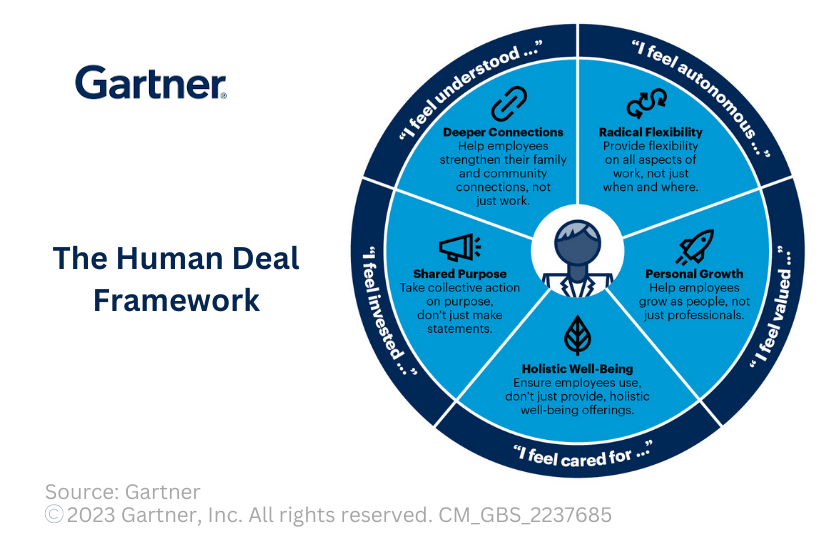
Employees Seek Personal Value and Purpose at Work. Be Prepared to Deliver.
Between layoffs and employees quitting their jobs in large numbers, it’s clear that the management principles underlying the employee value proposition (EVP) are outdated. Many organizations still seem focused on patching together short-term tactics to solve what has become a series of longer-term systemic truths regarding the future of work. Namely:
- Employees are people, not just workers.
- Work is a subset of life, not separate from it.
- Value comes through feelings, not just features.
Download Toolkit: Get Ahead of the 2023 Future of Work Trends
“The intent to leave or stay in a job is only one of the things that people are questioning as part of the larger human story we are living,” says Caitlin Duffy, Research Director in Gartner’s HR practice. “You could call it the ‘Great Reflection.’ ….It’s critical to deliver value and purpose.”
And, ignoring this shift is shortsighted. The pandemic stretched this elastic band so far that it can’t snap back. Moreover, people don’t want to go back. Many have developed a new sense of self-awareness and worth, and they won’t easily forget if they have felt undervalued.
A sense of personal value is key
People are continuing to ask themselves questions such as:
- What makes me happy and whole?
- What truly satisfies me?
- Where have I given away too much of myself for little return?
The last three years were a catalyst to elevate personal purpose and values. Unfortunately, while 82% of employees say it’s important for their organization to see them as a person, not just an employee, only 45% of employees believe their organization actually sees them this way.
This translates into soul searching over whether one feels valued in their work or whether they are merely creating outcomes and value to benefit others. Dissatisfaction with the answers increases employees’ intent to leave a job.
How employers should respond
Let’s start with compensation. Employees are growing more sensitive to pay disparities, especially in light of the salary transparency laws taking effect across the U.S. Negative employee perceptions of pay equity can result in a 15% decrease in intent to stay, 13% increase in job searching activity, and 13% decrease in employee engagement.
But pay is far from the only motivator. People want acknowledgment and growth opportunities and to feel valued, trusted and empowered. Frontline workers in particular voice a desire to feel respected. Employees increasingly want to bring their authentic selves to work.
Bottom line: People seek purpose in their lives — and that includes work. The more an employer limits those things that create this sense of purpose, the less likely employees will stay at their positions. The era of the employment contract, where a worker provided services purely in exchange for monetary compensation, is over. Now, employees expect deeper relationships, a strong sense of community and purpose-driven work.
Listen now: The Secrets to Implementing a Successful Hybrid Work Model
How to make your EVP more human-centric
Gartner research shows that a human-centric approach, which provides people with more control over their work and work environment, also makes them more productive. But it requires employers to rethink their approach. As with all fundamentally transformative strategies, this will take strategic commitment, leadership, culture development and thoughtfully applied technology.
Both leaders and employees must incorporate new norms and behaviors for enterprise culture that support the new reality. For example, leaders and managers will need to focus on eliciting sustainable performance without compromising long-term health through practices such as proactive rest — helping employees maintain their emotional resilience and performance, as opposed to taking recovery after both have plummeted. This may show up as mandated PTO before high-demand working periods, no-meeting Fridays, allotted wellness time and manager goals for team PTO.
This is an overall shift in performance management, which is moving beyond just measuring employees’ outcomes to reflect more context and empathy.

